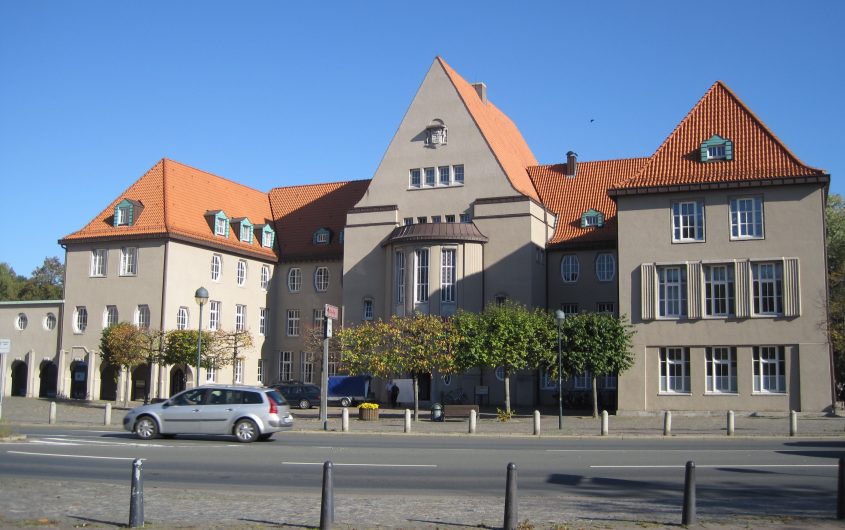
Wilhelmine Wulff via Wikimedia Commons
How to Resist the Merger of Anti-Vaxxers and Anti-Semites

Hilary Silver
The George Washington University
Hilary Silver is Professor of Sociology, International Affairs, and Public Policy and Public Administration at the George Washington University. She is co-organizer of the GW University Seminar on "Europe Since Covid" and a 2022 Fellow at the Hanse Wissenschaftskolleg. She has served as Director of the Urban Studies Program at Brown and Chair of the Department of Sociology at GW. She arrived at GW in 2017 after rising through the ranks at Brown University, where she is Professor emerita of Sociology and Urban Studies. Silver served two terms as Editor of City & Community, the journal of the Community and Urban Sociology Section of the American Sociological Association, which honored her with the Lynd Award for Career Lifetime Achievement.
She has held visiting appointments at the Ecole des Hautes Etudes en Sciences Sociales, INSEE, and INED in Paris, JNU and Centre des Sciences Humaines in New Delhi, Universite de Lille I, WZB, and at Oxford, Tel Aviv, Korea, Bristol, Sussex, New York, and Columbia Universities. At Harvard, she was a longtime Affiliate of the Minda de Gunzberg Center for European Studies, and in 2016, a senior fellow at the Ash Center of the Kennedy School of Government.
Silver has served as a consultant to major international organizations, including the World Bank, United Nations, IADB, and International Labor Organization, on issues of social exclusion and inclusion, and to the US Government and the State of Rhode Island on racial disparities.
She has received four Fulbright fellowships, fellowships from the American Institute of Indian Studies, Jawaharlal Nehru Institute for Advanced Study, and Hanse Wissenschaftskolleg, and multiple grants from the Deutscher Akademischer Austausch Dienst [DAAD], National Science Foundation, and National Endowment for the Humanities and RI Council for the Humanities. The latter funded her two films on urban issues, Southside and Direction Home, that aired on RI Public Television.
If International Holocaust Remembrance Day on January 27 has any meaning, it is to prevent the banalization and memory loss of the Shoah. Yet sadly, Nazi-coronavirus comparisons have proliferated on the American and German right wing. This tale of resisting real Nazis in their homeland shows one way to fight back.
Delmenhorst’s Monday Demonstrations
Delmenhorst is a small, quiet town in northwest Germany, an industrial suburb of Bremen, its larger city-state neighbor. But like elsewhere during the coronavirus pandemic, it has been infected by another disease: right-wing extremism. On the night of January 19, the publishing house of the local newspaper, the Delmenhorster Kreisblatt, was defaced with politically motivated graffiti, several swastikas, and the words “propaganda” and “We do Holocaust.”
Exploiting Jewish suffering for rhetorical advantage is not unique to Germany, of course; it is a sad but familiar occurrence in the United States. But as in Hamburg and a few other German cities, the authorities and citizens of Delmenhorst reacted swiftly and decisively. State security began investigating, the graffiti was promptly removed, and like the counterdemonstrators in Charlottesville, VA, where Heather Heyer lost her life in 2017, a broad swath of civil society hastily organized a counterdemonstration against the apparent perpetrators. On Monday evening, January 24, even as another such anti-vax walkabout was occurring, several hundred diverse citizens met in front of the City Hall to hear expressions of solidarity and support for science, the free press, the Jewish community, and all defenders of democracy.
The Nazi graffiti proved to be the last straw for residents who had put up with weeks of Monday demonstrations by Querdenker corona deniers and anti-vaxxers, joined by members of extreme right-wing and neo-fascist organizations from the region and beyond. Neo-Nazis and their followers had been marching maskless through the city center, defying regulations, as they had been throughout Germany. The marches deliberately perverted the laws of free assembly by claiming that the mob simply consisted of individuals out for a stroll, evading responsibility to pull a permit in the pandemic.
Rising anti-Semitism, racist backlash, and conspiracy theories about vaccines are becoming increasingly intertwined and violent in the United States.
These right-wing protests were well-organized in advance over Telegram and other right-wing social media where extremist hooligans and others exploit anti-vaccine sentiments and urge violent action. A similar strategy was applied in small towns in the state of Saxony where critics of so-called dictatorial pandemic measures met for unannounced demonstrations, camouflaged as “walks.” The locals there engaged in a “cat and mouse game” of toying with the police and corrupting freedom of speech, which is far more restrictive in Germany than in the United States when it comes to hate. This strategy of claiming that such strolls are harmless and peaceful was devised back in 2014 for the anti-migrant PEGIDA protests in Saxony. In fact, Delmenhorst residents claim to have spotted Michael Wittwer, a right-wing extremist active in the “Pro Chemnitz” and “Free Saxony” movements. Neo-Nazis, xenophobes, and anti-Semites are thus hijacking people, even those claiming to be on the far eco-left, duped by online vaccine conspiracy theories.
The January 24 counterdemonstration mobilized virtually all political and religious persuasions. A common theme was that those assembled expressed the true will of the majority. Indeed, a recent YouGov survey for the German news agency DPA found that some 60 percent of Germans support the introduction of compulsory vaccinations, compared to 32 percent who were against. Participants were lauded for their courage in standing up to the extremists. That included the far-right wing party, the Alternative for Germany (AfD), which is stronger in the east of Germany and claims to speak for “the people.”
Beneath a banner reading “Democracy Needs No Alternative,” the newly-elected CDU Mayor of Delmenhorst Petra Gerlach declared that the majority is complying with restrictions during the pandemic out of solidarity and for the general good. The presence of so many people showed that Delmenhorst stands united in defense of the rule of law and democratic freedoms. “We are Delmenhorst – together, determined, nonviolent,” she declared. Privately, she expressed how difficult it was to find the right words to speak about these incidents. She felt very strongly about them but also knew from her staff and the police about threats of violence against her on social media.
On the left, too, the Social Democratic Party speaker asserted that one can freely criticize pandemic policies without smearing swastikas on the walls, hurling insults, or joining the fascists. The Turkish Workers Association was also represented at the protest. There is increasing concern about the radicalization of the Querdenker movement. In March of 2021, a man hurled a Molotov cocktail at the Delmenhorst City Hall as an expression of his “dissatisfaction with the corona rules.”
Remembrance of the Holocaust also calls for remembering the brave people willing to stand up to organized hate.
The “Breites Bündnis gegen Rechts” (BBGR or Alliance against the Right) network helped organize the counterdemonstration with the slogan “to march with Nazis is not strolling.” The group’s spokesperson Hans-Joachim Mueller condemned the marchers’ attacks on journalists, civil servants, and doctors as well as their relativism of the Nazi dictatorship. He argued that the marches were anti-democratic for putting an alleged “will of the people” above democratic processes; at least latently anti-Semitic in asserting the existence of an alleged secret elite with secret plans and historically revisionist and insulting to the victims of the Nazi regime by portraying themselves as “persecuted like the Jews.”
As in the United States, their discourse belittled and relativized the Holocaust. The extremists equated masks with the yellow star, mask mandates with the Nuremberg laws, lockdowns as worse than what Anne Frank endured, and rules enforcement with Gestapo tactics. Pedro Benjamin Becerra spoke for the Delmenhorst Jewish community whose members were appalled by Nazis marching in their city streets and called for protests against them.
The Anti-Nazi Origins of the BBGR
This is hardly the first time the Delmenhorst community faced down neo-Nazis. The BBGR originated in 2006, in response to an effort of a Hamburg lawyer Jürgen Rieger to buy the ailing Hotel am Stadtpark opposite the same town hall of the 2022 counterdemonstration. Rieger was infamous for defending neo-Nazis and Holocaust deniers, questioning the gas chambers, parading in a Nazi uniform, and speaking at neo-Nazi rallies honoring Hitler’s deputy Rudolf Hess. The lawyer declared his intention to buy the hotel for the Wilhelm Tietjen Foundation for Fertilization Ltd, an organization founded by and named for a wealthy Nazi Luftwaffe officer from Bremen with the aim to promote racial purity. Rieger planned to convert the hotel into a neo-Nazi center for training, research, and conferences of the far-right NPD party. “We are not going to cover the facade with swastikas,” Rieger promised back then, which given the recent graffiti, seems especially ironic.
Ordinary citizens opposed what they called a school for Nazis. Many saw the move as part of a broader neo-Nazi strategy to buy up property to increase their presence in local communities. Opponents demonstrated in protest, held barbeques and rock concerts to raise funds, and created petitions, Weblogs, and exhibitions. A webpage garnered over 3,000 donations. The founder of what would become the BBGR helped raise some 800,000 euros for a counteroffer on the hotel. The city offered a matching donation of 2 million euros and rezoned the hotel into an urban renewal district that set limits on the sale. Redrawing the lines automatically gave the town a preemptive right to purchase the building at price defined by a neutral third party.
Making his own end run around the city, the hotel owner responded that he would then donate the hotel to the Wilhelm Tietjen Foundation which would assume his debts, pay the gift tax on the building, and buy the hotel’s inventory for 3.4 million euros. He claimed there were no other buyers due to the alleged noise from Turkish weddings nearby. Ultimately, the city prevailed and took control of the property which was later demolished. But broader legislative efforts to ban the NPD failed when the German Supreme Court ruled in 2017 that the party presented no real threat to democracy. Its numbers had dwindled to about 5,000 as its members switched to the AfD.
Transatlantic Lessons
If this story of a small town in Lower Saxony sounds familiar, it should. Rising anti-Semitism, racist backlash, and conspiracy theories about vaccines are becoming increasingly intertwined and violent in the United States. A national anti-vaccine rally on January 13 on the steps of the Lincoln Memorial featured Lara Logan, a former CBS News correspondent who, in a November appearance on Fox News compared White House chief medical adviser Anthony S. Fauci to the Nazi doctor Josef Mengele. The Facebook page for the rally compared vaccine mandates to the Holocaust and urged people to use force to stop the “tyrannical dictatorship” of mask and vaccine requirements.
As the January 6 commission is gradually uncovering in horrifying detail, there are organized anti-democracy efforts among white supremacists and neo-Nazis in the United States, too. They are taking advantage of heightened fear and distrust during the pandemic to win influence at the local level and use social media to forge an international right-wing movement, one whose reach extends even to small towns like Delmenhorst. Remembrance of the Holocaust also calls for remembering the brave people willing to stand up to organized hate.
The views expressed are those of the author alone and do not necessarily reflect the views of their employer.








